by Lisa Cooke | Apr 8, 2015 | 01 What's New, Norwegian, Video
MyHeritage is a leading resource for Scandinavian genealogy research. Now they are offering a free webinar for those researching Danish, 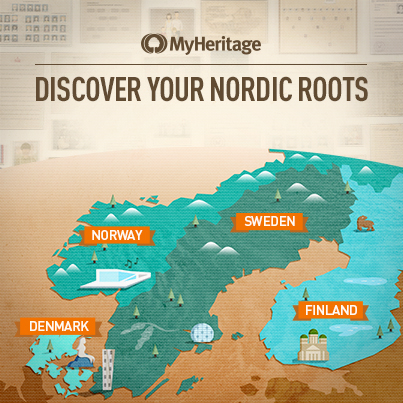 Finnish, Norwegian, Swedish and Icelandic ancestry.
Finnish, Norwegian, Swedish and Icelandic ancestry.
On Wednesday, April 15, Mike Mansfield, MyHeritage Director of Content and Jason Oler, MyHeritage Senior Program Manager, will host a program packed with research tips and strategies for navigating the millions of Scandinavian genealogy records now on MyHeritage. Click here to register.
Ready to learn about Scandinavian genealogy NOW? Genealogy Gems Premium members can access Premium Podcast Episode #15, in which Lisa interviews Scandinavian research expert Ruth Mannis at the Family History Library. Ruth simplifies and clarifies the process and reassures us that everyone can have success finding their Scandinavian roots. If you’re not a Premium member yet, you’re missing out on gems like Ruth Mannis’ interview–and more than 100 more premium podcasts like these and dozens of genealogy video tutorials. Get a year’s access
to all of this for one low price. Click here to learn more.
by Lisa Cooke | Jun 1, 2015 | 01 What's New, Beginner, Craft & Displays, images, Inspiration, Photographs
 As the host of the Genealogy Gems podcast, Lisa Louise Cooke spends a lot of time on the asking end of the microphone. Recently the tables were turned! Lisa was invited to appear on the The Paperclipping Roundtable, a scrapbooking podcast.
As the host of the Genealogy Gems podcast, Lisa Louise Cooke spends a lot of time on the asking end of the microphone. Recently the tables were turned! Lisa was invited to appear on the The Paperclipping Roundtable, a scrapbooking podcast.
Family history and scrapbooking are sister pursuits. Genealogy is more research-driven. Scrapbooking is a visual art. But they are both rooted in the preservation of stories.
In the podcast, Lisa and other guests chat about the new dimensions each pursuit brings to the other. Lisa has been creating scrapbooks since her children were young, and a fellow guest on this roundtable-style podcast is a scrapbooker who later discovered family history. Both have likely tried different styles of what you might call heritage scrapbooking.
Genealogy “seemed so overwhelming” at first, said the scrapbooker. “But once you start, it’s really a lot of fun.” From the point of view of a genealogist, the same might be said for scrapbooking!
Click the link above to hear Lisa on the free podcast. If you’re a “scrapbooking genealogist” (or a genealogy-loving scrapbooker) who would love to hear more inspiring tips about combining the two, contact us to let us know!
 Are you new to genealogy or ready to learn how to do it “right” from the start? Check out our free podcast, Family History Made Easy. In this series Lisa takes you through the process of tracing your family history step-by-step.
Are you new to genealogy or ready to learn how to do it “right” from the start? Check out our free podcast, Family History Made Easy. In this series Lisa takes you through the process of tracing your family history step-by-step.
by Lisa Cooke | Oct 14, 2015 | 01 What's New, Book Club, Inspiration
Have you ever experienced “genealogy serendipity?” Here’s a great book about it!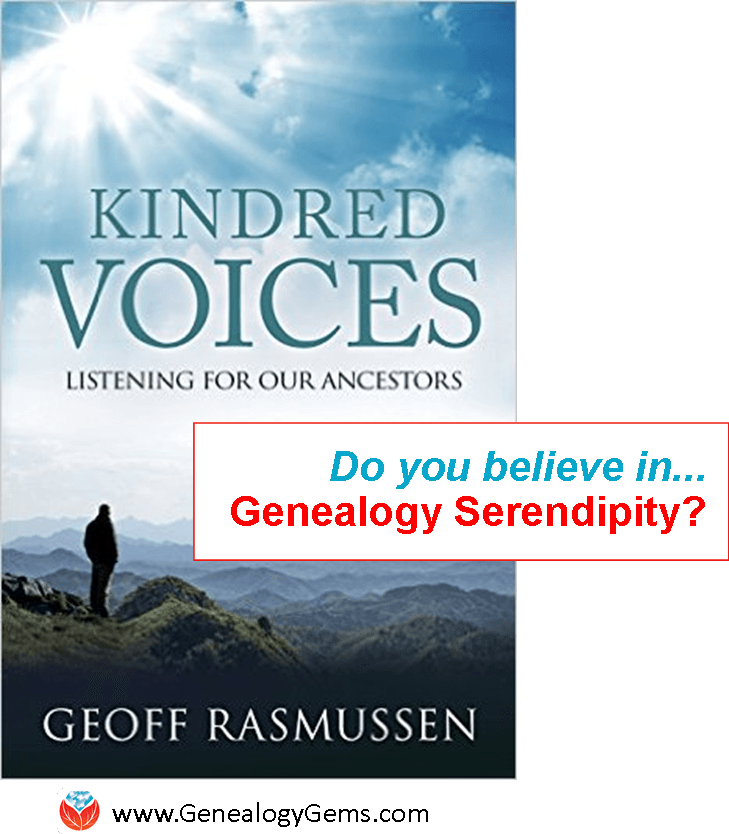
Recently, I came across an old blog post by my friend Geoff Rasmussen, in which he talks about discovering family gravestones while on a cruise.
A cruise doesn’t seem like the most likely place to discover ancestral grave markers. But his cruise ship stopped at Bar Harbor, Maine, near where several generations of his family lived.
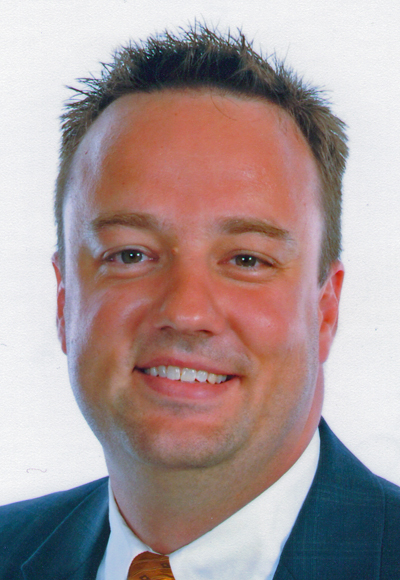 Geoff stepped off and followed his instincts, his GPS device and–he believes–his ancestors themselves. In the short time he had for a shore excursion, he found the long-elusive graves of several relatives in several cemeteries, including distant great-grandparents.
Geoff stepped off and followed his instincts, his GPS device and–he believes–his ancestors themselves. In the short time he had for a shore excursion, he found the long-elusive graves of several relatives in several cemeteries, including distant great-grandparents.
Sooner or later, many of us experience “genealogy serendipity” moments like these. It’s that moment when an ancestor seems to be sitting on your shoulder, leading you to information about her. Or when an uncanny number of coincidences put you in the right place and time to make an important family connection. It can be downright eerie sometimes!
I’ve had my fair share of those types of experiences. I’ve talked about them before on the podcast, like in the free Genealogy Gems Podcast Episode 106, when I recounted the numerous buy medicine online paypal unusual happenings during my recent trip to England! And before that, in Episode 39, about how my great-grandmother Lenora Herring’s crazy quilt came into my possession. The story really wasn’t about the quilt. It was about listening to and following the guidance of my ancestors, even though in the moment the path wasn’t clear.

 We all need a little inspiration now and then to stay on the genealogical journey. That’s why I am so happy that Geoff took the time to write more of his fabulous stories down. His new book, Kindred Voices: Listening for our Ancestors
We all need a little inspiration now and then to stay on the genealogical journey. That’s why I am so happy that Geoff took the time to write more of his fabulous stories down. His new book, Kindred Voices: Listening for our Ancestors , is chicken soup for the genealogical soul indeed. This is a gem of a book! Geoff writes that his purpose is to “further energize” us as genealogists, and “give new meaning to the experiences” we have with genealogy serendipity. These are his true stories of feeling the presence of his ancestors as he looks for them.
, is chicken soup for the genealogical soul indeed. This is a gem of a book! Geoff writes that his purpose is to “further energize” us as genealogists, and “give new meaning to the experiences” we have with genealogy serendipity. These are his true stories of feeling the presence of his ancestors as he looks for them.
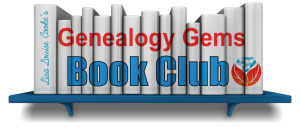 We love passing along book suggestions! Have you seen the ones we’ve recommended for the Genealogy Gems Book Club? Check them out! And thank you for sharing this book recommendation with others you think will enjoy it. You’re a gem!
We love passing along book suggestions! Have you seen the ones we’ve recommended for the Genealogy Gems Book Club? Check them out! And thank you for sharing this book recommendation with others you think will enjoy it. You’re a gem!
by Lisa Cooke | Dec 27, 2015 | 01 What's New, Beginner, Google, Listeners & Readers, Research Skills
The mysterious deaths of a father and son present a perfect opportunity for using Google for genealogy.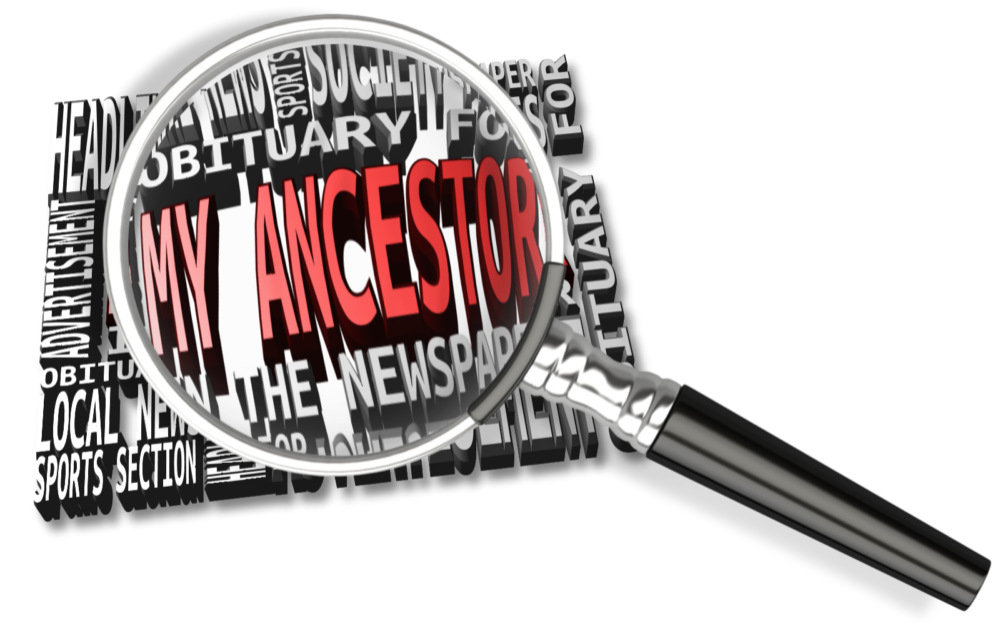
Recently I heard from Lydia, who has just started listening to my podcasts. She asked a great question that Google can help answer:
“I have two relatives, great-grandfather and great-great-grandfather, who died under conditions where an inquest was conducted. I wrote to the county clerk’s office in Joplin, MO. They were only able to send me the “bill” for both inquests, stating they had no other information. What I want to know, what they didn’t answer, was are they the ones to ask for the inquest report? If it still exists who would have it?”
She shared their names (both Esterline) and details about their deaths and I just couldn’t help myself: I had to Google them myself. There’s nothing like a couple of mysterious deaths–two generations in a row!–to pique my curiosity.
Here’s the path I took and take-home tips to offer anyone looking for genealogical records:
1) A Google search for: coroner’s inquest 1928 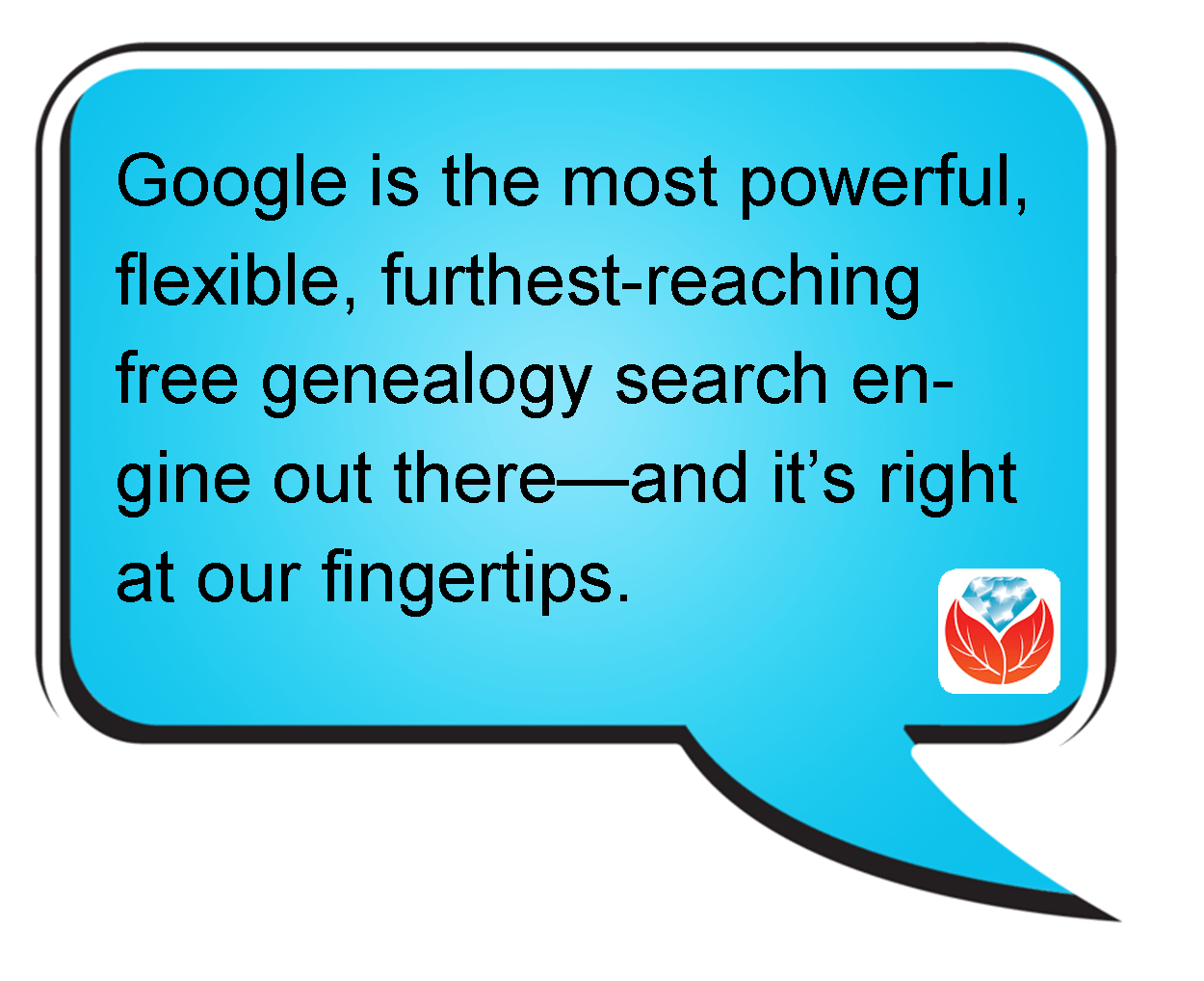 Missouri delivered the Coroner’s Inquest database at the Missouri Digital Heritage archive. From there, you discover that you can request copies of records by emailing the citation for the record you want to the Missouri State Archives at archref@sos.mo.gov. According to the instructions, “The record will be located, the number of pages counted, and you will be notified by email of the cost of the copies. Upon receipt of a check, the copies will be made and mailed to you. There may also be additional notations in the record about other locations where the files can be accessed.” Interestingly, when I searched for her two relatives, I didn’t find them, but there was a file for a woman with the same surname: Esterline. It’s worth seeing if she’s related somehow.
Missouri delivered the Coroner’s Inquest database at the Missouri Digital Heritage archive. From there, you discover that you can request copies of records by emailing the citation for the record you want to the Missouri State Archives at archref@sos.mo.gov. According to the instructions, “The record will be located, the number of pages counted, and you will be notified by email of the cost of the copies. Upon receipt of a check, the copies will be made and mailed to you. There may also be additional notations in the record about other locations where the files can be accessed.” Interestingly, when I searched for her two relatives, I didn’t find them, but there was a file for a woman with the same surname: Esterline. It’s worth seeing if she’s related somehow.
2) I was suspicious about no other Esterlines coming up in the database, so I tried a search in the Archives on Joplin and Jasper to see if other cases from that town or county come up in the results, and they don’t. Further digging reveals: “The Coroner’s Inquest Database project is ongoing; additional counties will be added to the database as completed.” However, it would be very worthwhile to contact them by email and inquire as to where this county is in the queue and where the physical files are now. Another result in that same Google search reveals which counties the Archive currently does have: includes Andrew, Cape Girardeau, Clinton, Cole, Greene, Pemiscot, Perry, St. Charles, St. Francois, St. Louis, and Stoddard (coverage varies by county).
3) After searching a single database on a website like Missouri Digital Heritage, I always look for a global search page, where I can search all databases on the site at once. Missouri Digital Heritage has one here. A search on Esterline brings up not only death certificates (which you probably already have) but city directory entries, newspapers and more.
4) I always recommend that genealogists get to know their record sources. Again, through my Google search I discovered The Laws of Missouri Relating to Inquests and Coroners (1945). This may provide some further insight. And the FamilySearch Wiki is always invaluable. Here’s the page on Missouri Vital Records and it states that “original records are available on microfilm at the Missouri State Archives.”
5) I pretty much always do a quick search specifically at Google Books since they have over 25 million books. I searched Ben Esterline and the first result was a listing in the Annual Report of the Bureau of the Mines (1932) (the year he died!): “FATAL ACCIDENTS— LEAD AND ZINC MINES Ben Esterline, prospector.” The book is not fully digitized in Google Books, but click “Libraries that have it” and you’ll be taken to the card catalog listing in WorldCat which will show you where you can obtain it.
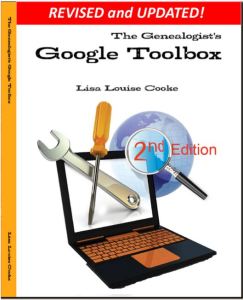 I’m telling you, Google is the most powerful, flexible, furthest-reaching free genealogy search engine out there—and it’s right at our fingertips! But you do need to learn how to use it effectively, or you could find yourself wading through 87,400 results for an ancestor like “Ben Esterline.” Instead, learn the strategies I teach in The Google’s Genealogist Toolbox. This second edition–new in 2015–is fully updated and loaded with techniques and examples on search strategies and tools that help you use Google for genealogy (and everything else in your life!). Click here to order your copy and you’ll start Google searching much smarter, much sooner.
I’m telling you, Google is the most powerful, flexible, furthest-reaching free genealogy search engine out there—and it’s right at our fingertips! But you do need to learn how to use it effectively, or you could find yourself wading through 87,400 results for an ancestor like “Ben Esterline.” Instead, learn the strategies I teach in The Google’s Genealogist Toolbox. This second edition–new in 2015–is fully updated and loaded with techniques and examples on search strategies and tools that help you use Google for genealogy (and everything else in your life!). Click here to order your copy and you’ll start Google searching much smarter, much sooner.
More Gems on Google for Genealogy
7 Free Search Strategies Every Genealogist Should Use
Google Keyword Search Tips
How to Make Google Cache Pay Off in Your Genealogy Research
by Lisa Cooke | Mar 23, 2016 | 01 What's New
This multimedia kit is a comprehensive and exciting way to learn to trace your Irish genealogy. Priced at just for EVERYTHING, you save nearly 0 on retail for a limited 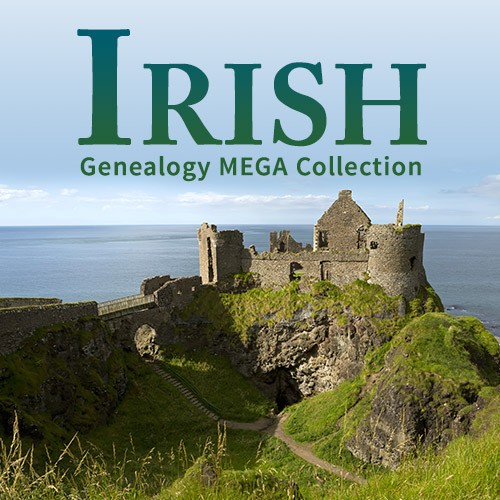 time, it’s a lucky deal, if I ever saw one!
time, it’s a lucky deal, if I ever saw one!
Tracing your Irish roots takes a bit of luck and a lot of patience. But the payoff for those who persist can be huge. The Irish have a rich history and culture that descendants love to embrace. And it’s getting more exciting to be an online Irish researcher, with important new Irish records coming online frequently.
One of the biggest Irish genealogy challenges is the destruction of the Public Records Office during the Irish Civil War. But while many records were lost, there are plenty of ways to find information on your ancestors.
Even better, during March Family Tree Magazine has slashed the price of its Irish Genealogy MEGA Collection. This comprehensive multimedia collection is a family historian’s pot of gold, packed with everything from tips on breaking down your Irish brick walls to finding vital and census records, immigration forms, and a thorough list of useful websites. Plus, you’ll get the historical background that drove emigration and affected your ancestors’ lives – as well as your research.
Here are the incredible tools you will get:
- EIGHT on-demand webinars on different aspects of Irish research
- A full-length e-book, A Genealogist’s Guide to Tracing Your Irish Ancestors
- A digital cheat sheet and an overview article for quick reference.
I love this multimedia kit because you can read, watch and learn at your own pace. The digital 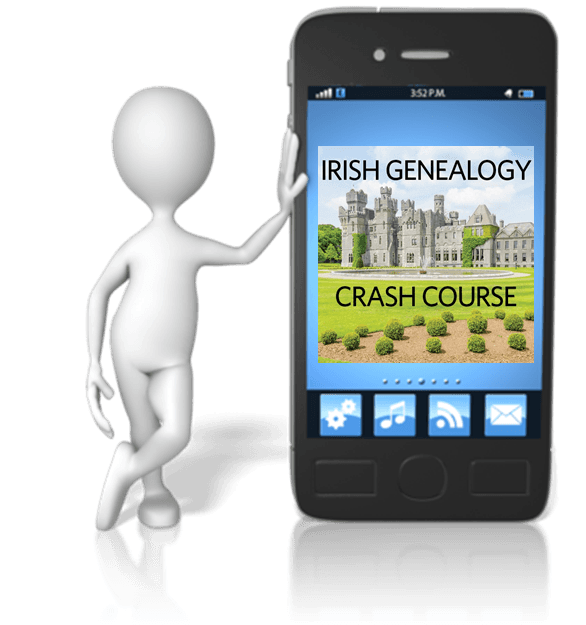 format means you can put the entire kit on your favorite mobile device. That lets you learn on-the-go and consult your reference library while you’re out researching. Of course you can use these materials on your home computer, too. The choice is yours–and with the limited-time price on this mega kit, the fabled luck of the Irish is yours, too!
format means you can put the entire kit on your favorite mobile device. That lets you learn on-the-go and consult your reference library while you’re out researching. Of course you can use these materials on your home computer, too. The choice is yours–and with the limited-time price on this mega kit, the fabled luck of the Irish is yours, too!
More Irish Genealogy Gems
 Finnish, Norwegian, Swedish and Icelandic ancestry.
Finnish, Norwegian, Swedish and Icelandic ancestry. 



 Geoff stepped off and followed his instincts, his GPS device and–he believes–his ancestors themselves. In the short time he had for a shore excursion, he found the long-elusive graves of several relatives in several cemeteries, including distant great-grandparents.
Geoff stepped off and followed his instincts, his GPS device and–he believes–his ancestors themselves. In the short time he had for a shore excursion, he found the long-elusive graves of several relatives in several cemeteries, including distant great-grandparents.


 Missouri delivered the
Missouri delivered the 
 time, it’s a lucky deal, if I ever saw one!
time, it’s a lucky deal, if I ever saw one! format means you can put the entire kit on your favorite mobile device. That lets you learn on-the-go and consult your reference library while you’re out researching. Of course you can use these materials on your home computer, too. The choice is yours–and with the limited-time price on this
format means you can put the entire kit on your favorite mobile device. That lets you learn on-the-go and consult your reference library while you’re out researching. Of course you can use these materials on your home computer, too. The choice is yours–and with the limited-time price on this 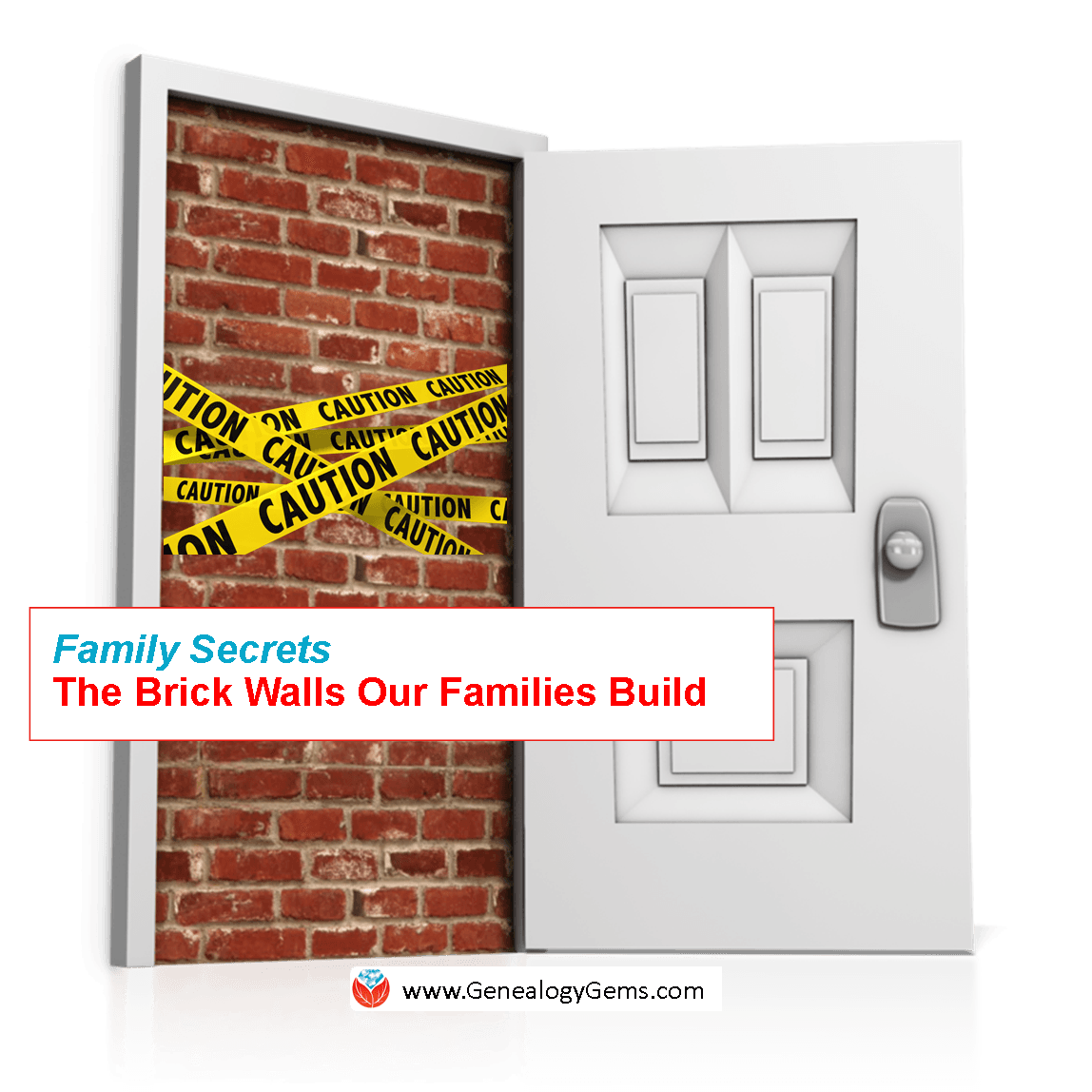 Beginning Irish Genealogy: Free Tips and Records
Beginning Irish Genealogy: Free Tips and Records


